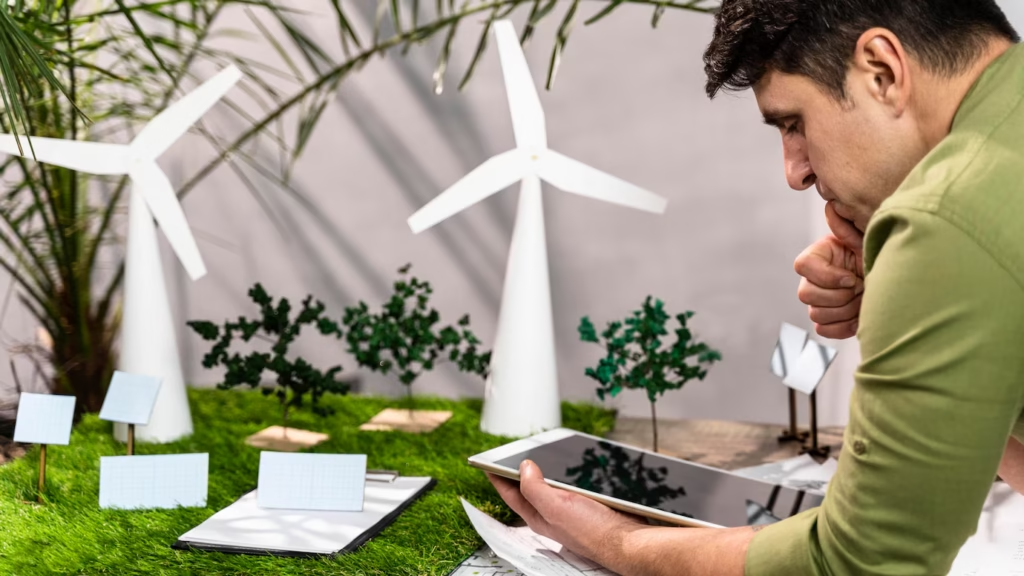Sustainable Living: 10 Practical Steps to Reduce Your Carbon Footprint and Build a Greener Future
Introduction: The Need for Sustainable Living
Climate change, pollution, and resource depletion are accelerating at an alarming rate. The consequences are evident in rising global temperatures, frequent natural disasters, and the depletion of essential resources.

The time to act is NOW. Every choice you make contributes to either worsening the problem or being part of the solution. Sustainable living is no longer just a lifestyle choice—it is a responsibility.
🌱 What You’ll Learn in This Guide:
- The impact of sustainable living on the planet and future generations.
- Simple yet powerful changes you can make today.
- Real-life success stories that prove going green is achievable.
- A recent case study demonstrating the effects of sustainability.
- Frequently asked questions (FAQs) to clear all doubts.
🌍 Understanding Sustainable Living

Sustainable living means making conscious choices to minimize environmental harm and preserve resources for future generations. It revolves around three main pillars:
| Pillar | Description |
|---|---|
| Environmental | Reducing carbon footprint, conserving water, and cutting waste. |
| Economic | Supporting ethical brands and reducing unnecessary expenses. |
| Social | Promoting fair trade, local businesses, and community-driven sustainability efforts. |
By balancing these pillars, we can create a sustainable world where people and nature thrive together.
🚀 10 Easy and Effective Ways to Live Sustainably

1. Reduce, Reuse, Recycle ♻️
One of the simplest ways to be more sustainable is by following the 3 R’s:
- Reduce consumption of single-use plastics and unnecessary packaging.
- Reuse items like glass jars, cloth bags, and water bottles.
- Recycle properly by separating paper, plastic, and metal waste.
2. Switch to Renewable Energy ☀️
Renewable energy sources, such as solar and wind power, reduce dependence on fossil fuels. You can:
- Install solar panels to generate your own clean electricity.
- Choose a green energy supplier for your home.
- Support policies and initiatives that promote renewable energy use.
3. Adopt a Plant-Based Diet 🥗
Switching to a plant-based diet, even partially, significantly lowers carbon emissions and conserves water. Try:
- Incorporating more vegetables, fruits, and legumes into your meals.
- Reducing meat and dairy consumption, which have a high environmental impact.
- Supporting local farmers and organic produce markets.
4. Support Sustainable Brands 🛍️
When shopping, choose brands that prioritize eco-friendly production and fair trade practices. Look for:
- Products with minimal or biodegradable packaging.
- Companies that give back to environmental causes.
- Ethical certifications such as Fair Trade, B Corp, or USDA Organic.
5. Save Water & Energy 💧
Conserving water and energy helps lower your carbon footprint and utility bills. Simple ways include:
- Using energy-efficient appliances and LED lights.
- Turning off unused lights, electronics, and water taps.
- Installing low-flow showerheads and dual-flush toilets.
6. Eco-Friendly Transportation 🚴

Transportation is a major contributor to pollution and greenhouse gases. Sustainable options include:
- Walking or cycling for short trips.
- Using public transport or carpooling whenever possible.
- Switching to electric or hybrid vehicles.
7. Grow Your Own Food 🌿
Starting a home garden helps reduce food transportation emissions and ensures fresh, organic produce. You can:
- Grow herbs and vegetables in your backyard or balcony.
- Compost organic waste to enrich the soil.
- Use rainwater harvesting for watering plants.
8. Compost Organic Waste 🍂
Composting helps reduce landfill waste and creates nutrient-rich soil. Easy composting tips:
- Gather kitchen waste like fruit and vegetable peels, used coffee grounds, and eggshells.
- Avoid composting dairy, meat, and oily foods to prevent pests.
- Use a compost bin or pit to decompose waste naturally.
9. Say No to Fast Fashion 👗
The fast fashion industry ranks among the top contributors to global pollution.. Choose sustainable fashion by:
- Buying high-quality, durable clothing instead of cheap, disposable items.
- Shopping from thrift stores or ethical brands.
- Repairing and repurposing old clothes instead of discarding them.
10. Spread Awareness 📢
Encourage friends, family, and colleagues to adopt a greener lifestyle. You can:
- Share eco-friendly tips on social media.
- Participate in local sustainability initiatives.
- Educate children about the importance of environmental conservation.
📊 Case Study: How a Small Town Reduced Its Carbon Footprint by 40%

In 2023, Asheville, North Carolina, implemented a zero-waste strategy that transformed the community:
✅ Banned single-use plastics.
✅ Installed solar-powered streetlights.
✅ Encouraged composting and rainwater harvesting.
✅ Created bike-friendly zones to reduce vehicular pollution.
The Result? Within two years, Asheville reduced its carbon emissions by 40%. This demonstrates the real impact of sustainability when a community works together.
📌 Final Thoughts: Every Action Counts!
Sustainable living is not about perfection—it’s about progress. Minor lifestyle adjustments can create substantial positive impacts on the environment. Whether you start by reducing plastic use, switching to renewable energy, or growing your own food, every step matters.
👉 Take Your First Step Towards a Greener Future! 🌍💚
❓ FAQs – Your Questions Answered!
1. Is sustainable living expensive?
No! Many eco-friendly habits, like reducing waste and conserving energy, actually save you money over time.
2. Can small changes really make a difference?
Absolutely! If a million people switched to reusable bags, billions of plastic bags would be prevented from polluting the planet.
3. What’s the best way to start living sustainably?
Start small—reduce plastic use, switch off unused lights, and buy from ethical brands.
4. Are eco-friendly products worth the investment?
Yes! While some may have a higher upfront cost, they save money and resources in the long run.
📢 Your Turn!
Which of these sustainable habits have you already adopted? What changes are you planning to make? Share your thoughts in the comments below! 🌱💬
